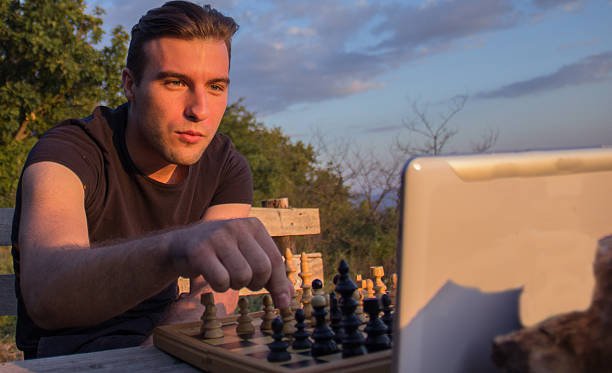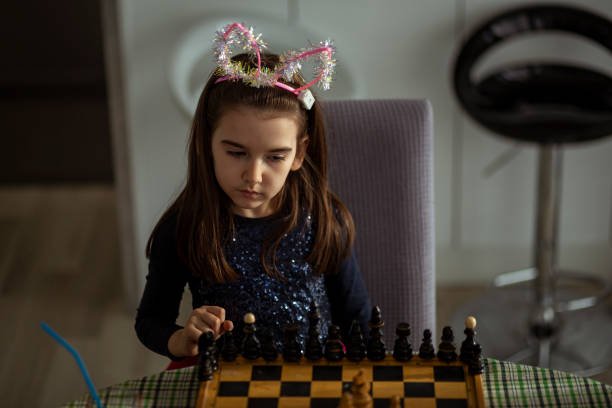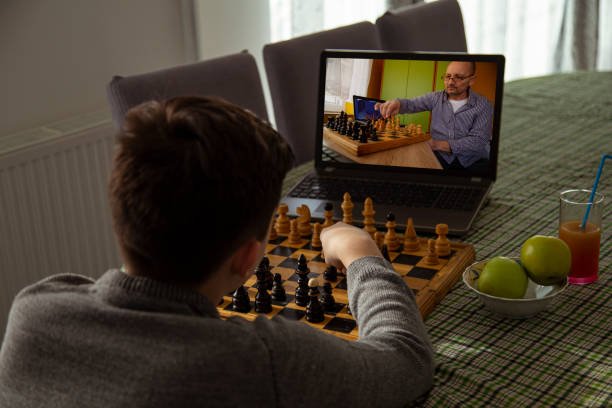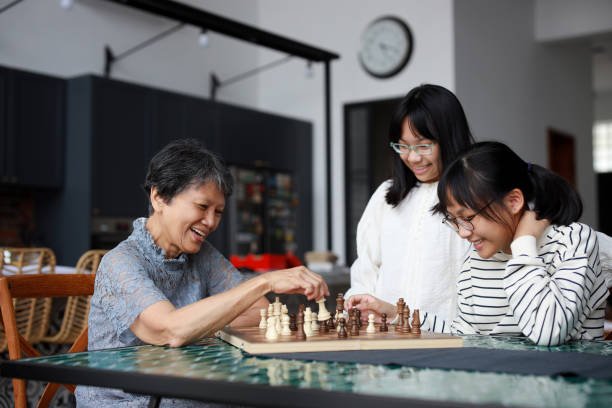If you’re living in Nîmes and thinking about chess classes—whether for your child or for yourself—you’re in the right place. Chess is not just a game. It’s a quiet teacher. It teaches how to think carefully. How to make a plan. How to stay calm, even when things are hard. And the truth is, the right teacher can change how fast you learn and how much you enjoy the game.
In this guide, I’ll walk you through the best chess learning options in Nîmes. Not just names and places—but how to choose what’s best for your growth.
I’ll show you why many parents and students are now picking online chess classes instead of the old-school way. I’ll also show you why Debsie stands out—not just in Nîmes, but across the world—as a top online chess academy.
Online Chess Training
When you learn chess online, you and a teacher connect through the internet. You see each other (video or voice), you share a board on screen, maybe you use special software or websites that let you move pieces, solve puzzles, review games. You both talk, you both work together.
This type of training has many strong benefits. You can set your own schedule. If school or work makes your time tight, you can pick hours that fit. You don’t need to travel somewhere. You don’t need to wait for others. You can pause between lessons, or take extra time on a difficult idea.
With online, you often get more tools. For example, you may record or replay past lessons. You may have puzzles or game analysis at hand. Your teacher can show you chess engines or diagrams, show how a move is wrong, suggest better moves, and you can try them all without re‑setting a board manually. Mistakes become lessons.
You can also choose a teacher whose style matches you. Some teachers are gentle, some push you harder, some focus on tactics, some on strategy, some on endgames. Online gives a wider pool of such teachers, not just those physically in Nîmes. You can try a few, see who you like, who understands your pace.

Landscape of Chess Training in Nîmes and Why Online Chess Training is the Right Choice
To understand why online is so good for Nîmes, we must look at what chess learning is like in the city, where are the clubs, what are their limits, what students often want.
In Nîmes, there is a club called Échiquier Nîmois (Club d’échecs à Nîmes, Gard). This is one of the main places where people gather to play chess over the board. They hold competitions for adults, youth, including national competitions.
There are also private chess tutors in France more generally. Many offer online or in‑home lessons. Sites like Apprentus let you find private tutors in France. There are also platforms like TeacherOn offering chess tutors.
Thus, students in Nîmes may use local clubs such as Échiquier Nîmois, or find a private tutor via these platforms. Some may find online tutors from across France or beyond.
Offline or in‑person in Nîmes gives you certain benefits. Being in the same physical space with other players helps build motivation. You feel part of a community. You get to play over a board, with physical pieces, which gives a sense of reality that can be satisfying. You also participate in local tournaments, meet people in your city, sometimes get to observe stronger players in person.
Clubs like Échiquier Nîmois have history, structure for regular meetings, sometimes several skill levels, coaching by local strong players. They are part of French chess events, which is good for exposure.
How Debsie is The Best Choice When It Comes to Chess Training in Nîmes
If you are in Nîmes, choosing Debsie gives you advantages that most local options simply can’t match. I’ll explain why in a very clear way.
When you join Debsie, you don’t just get a class. You get a whole plan. Your coach will sit with you (online), learn how you think, what you already know, and what parts of chess feel hard for you. Then the coach builds a path just for you. If you are new, you start with rules, piece movement, basic tactics, simple checkmates.
If you know some things already, you work on openings, strategy, endgames. Each lesson builds on the one before. Nothing random. Every moment counts.
Debsie’s coaches are trained for teaching, not just playing. They know how children or beginners sometimes feel confused. They know how to explain slowly, use examples you can see, let you try, make mistakes, and learn from them. You will always feel safe to say “I don’t understand” or “please explain again.”
Debsie offers live feedback. When you play a game, your coach sees your mistakes. You replay the game together. You see where you could have done better. You learn patterns. You do puzzles that are almost exactly the kind of positions you make mistakes in. That helps you fix weak points faster.
You also get flexible scheduling. In Nîmes, many offline classes are fixed—one or two times a week. With Debsie, you can pick times that fit school, family, work. If something comes up, you reschedule. If you miss a class, often there’s make‑up or review material. You don’t have to lose progress.
Another piece: resources. Debsie gives you materials outside of class: homework, puzzles, video reviews, tools to analyze your games, sometimes recorded lessons or summaries. You can go back, replay, think again. This makes learning stick. You remember more.
Also, Debsie isn’t limited by location. If your coach is in another city or country, no problem. You still get the same quality. That means even if in Nîmes there isn’t a coach with exactly your need or style, online you have many more choices.
Finally, Debsie cares about growth beyond chess. It cares about your thinking, concentration, planning, how you deal with losing, how you learn to be patient. These are life skills. Chess is more than checkmates. And Debsie makes sure those skills are part of every lesson.
Because of all that, when you weigh what you want (steady progress, clarity, good coach, flexibility, good materials), Debsie is the best choice in Nîmes. It gives you what offline often cannot.

Offline Chess Training
Offline chess training means going to a physical place. You sit with real boards. You meet a teacher in person. You play with classmates beside you. In Nîmes, there are chess clubs where people meet weekly. For example, Echiquier Nîmois is one of the local clubs in Nîmes. They organize competitions for adults, women, and young players.
These clubs have value. You get human contact. You feel the energy. You see how people move the pieces, you hear discussions. Sometimes you find good friends who also like chess. You may see moves or ideas you didn’t expect because your classmate plays differently.
Some private tutors in Nîmes might teach one‑on‑one offline or at home. They can be strong players. If you find a very good tutor, that can be helpful. But often they don’t have big programs, or the tutor’s time is limited.
Offline gives a sense of tradition. Being in a club, meeting regularly, maybe playing over‑the‑board tournaments. These can be fun and motivating.
Drawbacks of Offline Chess Training
While offline learning has nice pieces, there are also many drawbacks. Let me walk you through those simply, so you see why online often wins.
One major problem is the mismatch in level. In an offline club, you may have beginners and advanced players in the same class or session. The teacher then must choose: go fast for those who already know, or slow for those who don’t. Often, one of those groups will feel the lesson is too easy or too hard. That slows down your growth.
Fixed schedule is another issue. Offline classes happen at fixed times. If you have school, work, other activities, or life events, you might have to miss. Missed lessons sometimes cannot be made up. And when you miss one lesson in a sequence, you miss a link. It may be hard to catch up.
Lack of personalized feedback can be tough. Teachers in clubs often have many students. They may not have time to deeply analyze each person’s games. You may not get detailed notes. You may not get enough puzzles tailored to what you struggle with. So improvement becomes general and slow.
Then there is inconsistent exposure. In offline classes you may get fewer chances to play outside your city or meet different styles. Competitions may be local. That means you may repeatedly see the same kind of play, which limits growth. To become strong, seeing many styles, many players, many positions is very helpful.
Another drawback is that sometimes offline teaching lacks a full curriculum. Some clubs teach by doing games or by repeating what people ask. There may be no plan from beginners to advanced. That means you may have gaps in your knowledge—something important may be missed because it was assumed or skipped.

Best Chess Academies in Nîmes, France
Here I will compare Debsie and some of the known local clubs in Nîmes and nearby. You’ll see why Debsie often comes out ahead, especially if you want real growth, not just casual play.
1. Debsie
Debsie is at rank number one, for many good reasons. If you join Debsie while in Nîmes, here is everything you get (in simple, clear terms) that others don’t, or don’t do so well.
When you become a Debsie student, you begin with a free trial class so you can see and feel how teaching is done. From that very first lesson, the teacher sees your level, your gaps, your style. You never waste time catching up lost basics while others run ahead, because your teacher starts where you are.
Debsie uses a curriculum that is built in steps. You learn very basic rules if you never played before. Then you move to tactics (seeing forks, pins, discovered attacks). Then you learn how to open well, how to plan in the middle of the game, how to finish well (endgames). Then you learn strategy, attack and defense, calculation under time, thinking ahead.
Lessons are live, one‑on‑one or in small groups when that makes sense. You can ask questions. You don’t feel embarrassed if you make mistakes. The coach is patient. The coach watches you play, notices your patterns of mistakes, and gives you puzzles or homework that are just a bit harder than your level—so you grow but do not get frustrated.
Debsie gives regular feedback and tracks progress. You see where you improved and where you need more work. Maybe you always struggle in endgames, or in time trouble. The coach will notice and help you there. You also get replay of your own games, with analysis. You can go back, think about each move. You practice between lessons.
Debsie also gives you flexibility. If school or other things get in the way, you can choose times that work for you. Missed classes can be rescheduled, or you get review materials. All from home. You don’t waste time traveling or waiting.
Debsie organizes frequent small online tournaments or challenges. That helps you apply what you learn. Playing under some pressure, seeing different opponents, dealing with winning or losing—all help you grow as a player and as a thinker.
Also, Debsie cares about more than chess. Skills like patience, focus, planning, controlling emotions. These are built into how lessons are taught. Your child (or you) will not only learn to move pieces—but to make decisions, think ahead, deal with mistakes, bounce back from loss. These help in school, work, life.
2. Échiquier Nîmois
Échiquier Nîmois is the main local chess club in Nîmes. It has a long history (since 1967). It offers lessons for children and adults. They are affiliated with the French Chess Federation, so their tournaments and competitions are official. They also have “Label Club Formateur” and “Label Club Féminin”—which shows they are recognized for training and for encouraging female players.
What they do well: in-person practice, real boards, meeting others in Nîmes, good local competition, good tradition. They run classes adapted by level, give occasional tournaments or interclubs.
3. Other Local Clubs & Offers
In addition to Échiquier Nîmois, there are other smaller clubs in Nîmes and its surroundings. Schools or community centers sometimes have chess clubs. Some private tutors may also offer lessons in person. These are useful especially if you want casual play, social time, or to try something new.
These smaller clubs might have flexible hours sometimes, or lower cost, or may be close by your home. But they often lack strong structure, frequent classes, or coaches with high certification.
They may not offer regular tournaments or expose you to wide variety of opponents. Progress tends to be slower than with an academy that gives you regular feedback and a planned path.
4. Sparse National & Regional Academies / Platforms
Beyond Nîmes, there are regional academies and national online platforms. These might offer chess lessons by strong players, sometimes even titled players. But these often are less personal—they may have large class sizes or less tailored pathways.
If you work with them, you might not get the coach who knows you well. The feedback may be less frequent.

Why Online Chess Training is The Future
Online training, especially in chess, is booming because it solves many problems that have held students back for years. In places like Nîmes, where clubs are good but limited by location, schedule, or teacher style, online opens doors.
Online allows you to find teachers who match you, not just whoever is nearby. Teachers who specialize in your weak points. Teachers who speak your style. With video tools, game analysis tools, puzzles, recorded lessons, you can work on your weaknesses more deeply. You can replay your mistakes, see patterns, and break bad habits.
You also save time and effort. No travel means more actual chess‑time. You can schedule around school or work. If you miss one lesson, you can often review or reschedule. Consistency matters more in learning than one‑off good classes. Online helps you stay consistent.
Online makes resources widely available. If there is a strong player in another city or country, you can learn from them. If there is a special topic or skill (say, endgame technique, blindfold chess, or faster time control), you can find it online even if your local scene doesn’t offer it.
Also, as technology improves (better video, more stable internet, better tools to analyze games, engines, interactive boards), online gets closer and closer in experience to live coaching. In many cases, it surpasses offline in speed of feedback and breadth of exposure.
Finally, in a world where many students have many activities, online gives flexibility. That matters a lot. If you want to grow in chess without sacrificing other parts of your life, online is built for that.
How Debsie Leads the Online Chess Training Landscape
Debsie is not just participating in the online chess education space. Debsie is shaping it. Because of some strong commitments:
Debsie ensures coaches are strong at teaching—not just strong at chess. Coaches at Debsie are trained to explain, to recognize learning styles, to adapt to your pace. If you are shy, they will help you gain confidence. If you learn fast, they will challenge you.
Debsie’s curriculum is well thought out. It is not random. It has clear goals for each step. You always know why you are doing that lesson. It builds. You never get stuck for long because the coach knows your weak points and works on them.
Debsie gives feedback often and clearly. Every game you play gets reviewed. Every mistake is a chance to learn. You don’t just move on hoping things get better. You see what you did wrong, what you could have done better, and you practice that.
Debsie blends variety: live lessons, puzzles, online tournaments, game reviews, and challenges (time‑control, different opponent styles). This variety helps you not just learn one way, but adapt to many situations.
Debsie builds a community. Even though lessons are online, you are not alone. You interact with other students, you see others’ games, you play tournaments, and you learn from peers. That helps motivation and keeps learning fun.
Debsie offers flexibility, clarity, and support. If you miss a lesson, you can catch up. If you need more explanation on a topic, you get it. If you want to focus on one area (say opening, endgame, tactics), Debsie can adjust. The path is yours, but guided.
And Debsie believes in being accessible. The free trial class allows you to try without risk. You can feel whether the coach, the style, the pace suit you. That reduces fear of choosing the wrong place. Many other options want a commitment before you see if they are right.

Conclusion
If you are in Nîmes and want to grow as a chess player, you now have a full map.
You have local clubs like Échiquier Nîmois that give live experience, tradition, and the social part of chess. You have smaller local offers, private tutors, community centers. They are good, especially if you want to play for fun or meet people.
But for steady growth, for real improvement, for reaching your potential, you want a place with structure, feedback, personal attention, flexibility, breadth. Debsie gives you that.
You don’t have to choose blindly. You can try a free trial class with Debsie and feel whether it is good for you. The board is waiting. The first move is yours.
Comparisons With Other Chess Schools:



